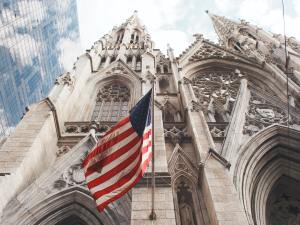Of Rule by Experts and Rule by Law
February 22, 2022 Leave a comment
Photo by Adam Szuscik on Unsplash
In the 1990s I was part of a congressional delegation to Argentina, when the Argentine economy was growing strongly and steadily, and inflation was low, the currency convertible 1-for-1 with the dollar. Trade barriers were being lowered, commerce was booming. I recall asking Argentines what could possibly darken what seemed to be a bright future. They were quick to reply: “Here in Argentina we have no rule of law. You can have no confidence in getting justice from the courts.” Not long after, political shenanigans to reward one part of the electorate by a transfer of wealth from others threw the Argentine economy into turmoil. Momentary good policy is a tough path to walk across bogs of inadequate legal safeguards. Freedom has rested upon rule by law rather than rule by men.
Fundamentally, the American Revolution was an assertion of the rule of law. Most of the Declaration of Independence is a litany of abuse by the English rulers. The Revolution was intended to take power away from man and men and rest it upon laws and rights, soon to be secured by the world’s first written Constitution.
The Progressive Movement, which thrived over a century ago, was a retreat, aggressively stepping backwards to the rule of men as an impatient alternative to the rule of law: the Rule of Experts. Their new view—really a very old view dressed up in modern rhetoric—was that there are benevolent experts, to whom we can safely yield our governance, for such understand the process of modern government better than ordinary people do.
It sounds akin to the ancient theory of Divine Right of Kings, that the worldly monarchs are chosen by God and invested with greater wisdom and perspective than the average man and woman. To their benevolent expertise and fatherly care was entrusted the governance of the rest of us.
Today’s benevolent experts are invested by their colleagues with varieties of credentials certifying their expertise. Not very democratic, they make no secret of their impatience with the Congress and other constitutional brakes on arbitrary authority.
Just as not all men are always just, not all men are reliably wise. The American Founders thought to address this problem by the separation of powers, dividing political authority among three branches in the Federal Government and the States.
The current regulatory program rests heavily on the notion that benevolent experts should be entrusted with authority for the big questions and increasingly smaller questions, too. It has evolved by progressively engulfing the constitutional separation of powers, merging legislative and executive—and often judicial—authority in “independent” regulatory agencies headed by unelected officials. The unelected federal regulator writes the details of mandatory regulations, charges violators, assesses guilt, and applies penalties.
Professedly efficient, it does not work well in practice. First, the regulators are not dispassionate umpires, limited to calling the balls and strikes. They are also players in the game, having their own set of particular interests and incentives that they take care of first.
Second, reliance on benevolent experts assumes what is an unproven, undemonstrated level of knowledge, insight, and forecasting skills. Regulators are not dumber than the rest of the population, but they are no smarter either. It is just that life is too complex and the society of the living is proving too much to be run by any designated group of humans and their computers.
A third flaw is mission creep. Even if the tasks are too great or require too much knowledge, insight, foresight, and other skills in unachievable degree, the regulators still take them on, with each failure met with calls to increase resources and power of the agency.
An example is the Federal Reserve (commonly called the “Fed”), created with a specific and rather narrow purpose, to make enough funding available for the banking system in times of financial stress. Before long, the Fed gained control of monetary policy and the practice of controlling interest rates. Later, it was tasked with promoting maximum employment. In 2010 the Fed’s role in supervising banks was enlarged to supervising any financial business considered to be systemically significant. Each augmentation has drawn the Fed away from its narrow, objective task.
This expansion of authority affects every business and every home. The Federal Reserve is the world’s biggest rigger of interest rates. Its prolonged policy of keeping short-term rates at or slightly above zero has resulted in penalizing all savers and those who live off of their savings, transferring trillions of dollars of wealth to borrowers, the biggest borrower being the Federal Government.
A partial but simple solution toward strengthening the rule of law and reducing exposure to the caprice of men would be returning to elected representatives the making of laws. It is a messy process, exactly the messy process that the Founders intended to preserve freedom from the encroachment of arbitrary and oppressive government. The regulators, which are theoretically part of the executive branch, should be limited to the duty of implementing the laws that the elected and accountable representatives make.
If Congress were required to write the rules and mandates, and delegate only the implementation, the mandates of government would be circumscribed by the exposure of a legislative body held directly accountable for what it has wrought. It is easy for legislators to complain about bad regulatory decisions, but too often, these are decisions that Congress never should have delegated to regulators in the first place.









